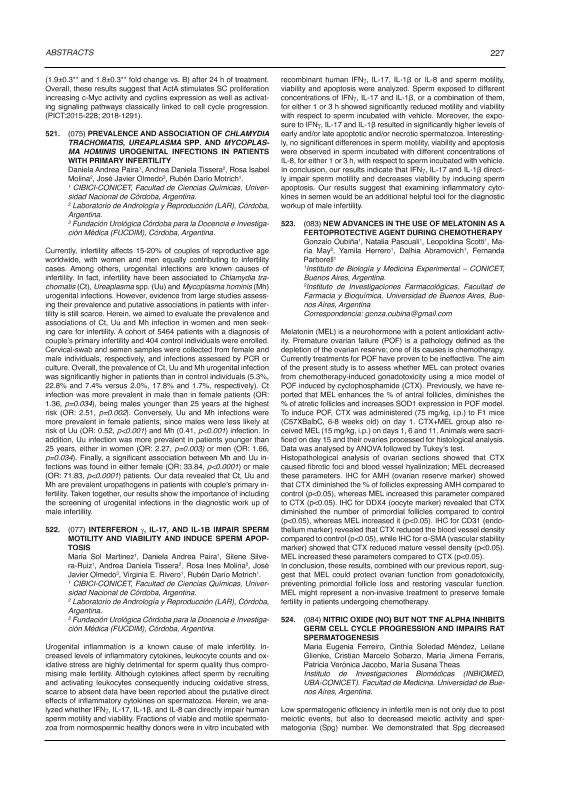Evento
Nitric oxide (NO) but not TNF alpha inhibits germ cell cycle progression and impairs rat spermatogenesis
Ferreiro, María Eugenia; Mendez, Cinthia Soledad ; Leilane, Glienke; Sobarzo, Cristian Marcelo; Ferraris, Maria Jimena
; Leilane, Glienke; Sobarzo, Cristian Marcelo; Ferraris, Maria Jimena ; Jacobo, Patricia Verónica
; Jacobo, Patricia Verónica ; Theas, Maria Susana
; Theas, Maria Susana
 ; Leilane, Glienke; Sobarzo, Cristian Marcelo; Ferraris, Maria Jimena
; Leilane, Glienke; Sobarzo, Cristian Marcelo; Ferraris, Maria Jimena ; Jacobo, Patricia Verónica
; Jacobo, Patricia Verónica ; Theas, Maria Susana
; Theas, Maria Susana
Tipo del evento:
Reunión
Nombre del evento:
LXVI Reunión anual de la Sociedad Argentina de Investigación Clínica; LXIX Reunión Anual de la Sociedad Argentina de Inmunología; LIII Reunión Anual de la Asociación Argentina de Farmacología Experimental y XI Reunión Anual de la Asociación Argentina de Nanomedicinas
Fecha del evento:
17/11/2021
Institución Organizadora:
Sociedad Argentina de Investigación Clínica;
Sociedad Argentina de Inmunología;
Asociación Argentina de Farmacología Experimental;
Asociación Argentina de Nanomedicinas;
Título de la revista:
Medicina
Editorial:
Fundación Revista Medicina
ISSN:
1669-9106
Idioma:
Inglés
Clasificación temática:
Resumen
Low spermatogenic efficiency in infertile men is not only due to post meiotic events, but also to decreased meiotic activity and spermatogonia (Spg) number. We demonstrated that Spg decreased number negatively correlates with the number of immune cells in testicular biopsies of azoospermic patients. Proinflammatory agents nitric oxide (NO) and TNFα produced by the immune cells that infiltrate the testis might impair spermatogenesis. Our objective was to evaluate the effect of NO and TNFα on Spg and preleptotene spermatocyte (PLs) proliferation and spermatogenesis progression in adult Wistar rats. DETA-NOnoate (DETA-NO), a NO donor, or TNFα were injected in one testis, saline was injected in the contralateral testis. On day 5, a group of animals received BrdU injection (ip) and were euthanized 2h later in order to evaluate proliferation, by immunofluorescense. Another group was sacrificed on day 60 to evaluate the effect on spermatogenesis. DETA-NO (2 and 10mM) significantly reduced the number of BrdU+Spg/seminiferous tubule (ST) (p<0.05, Student paired t test, n=3) and the number of BrdU+PLs/ST (p<0.01; Student paired t test, n=3) vs saline. These events slowed seminiferous epithelial cycle, demonstrated by the significant reduction in the number of ST at VII-VIII stage (p<0.01; Student t test, n=3). Variations in STs? area reflect the magnitude of spermatogenesis damage; after 60d DETA-NO (2 and 10mM) significantly increased the frequency of STs of small and reduced area respectively vs. saline (p<0.05; Student t test, n=3). TNFα (0.1 and 1µg) exposure affects neither Spg nor PLs proliferation or spermatogenesis. We demonstrated that NO arrests the cell cycle of premeiotic GCs, limiting Spg mitotic amplification division and the entrance of PLs in meiosis. These events might generate time gaps in the spermatogenic wave lastly affecting sperm production.
Palabras clave:
OXIDO NITRICO
,
TNFALPHA
,
ESPERMATOGONIAS
Archivos asociados
Licencia
Identificadores
Colecciones
Eventos(INBIOMED)
Eventos de INSTITUTO DE INVESTIGACIONES BIOMEDICAS
Eventos de INSTITUTO DE INVESTIGACIONES BIOMEDICAS
Citación
Nitric oxide (NO) but not TNF alpha inhibits germ cell cycle progression and impairs rat spermatogenesis; LXVI Reunión anual de la Sociedad Argentina de Investigación Clínica; LXIX Reunión Anual de la Sociedad Argentina de Inmunología; LIII Reunión Anual de la Asociación Argentina de Farmacología Experimental y XI Reunión Anual de la Asociación Argentina de Nanomedicinas; Argentina; 2021; 237-238
Compartir



